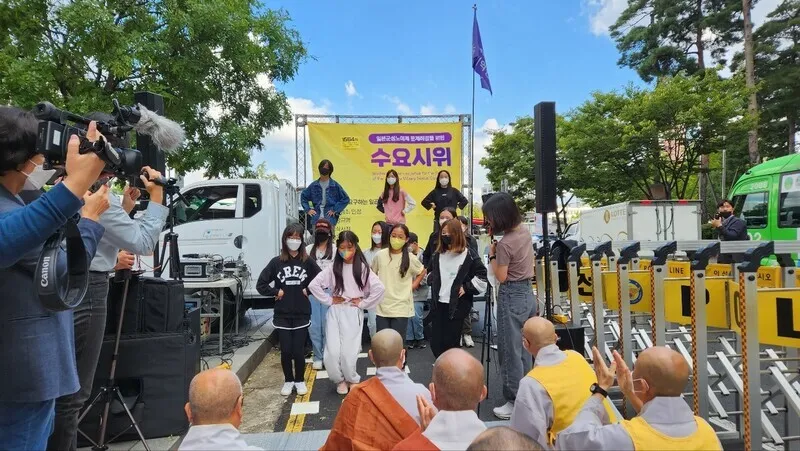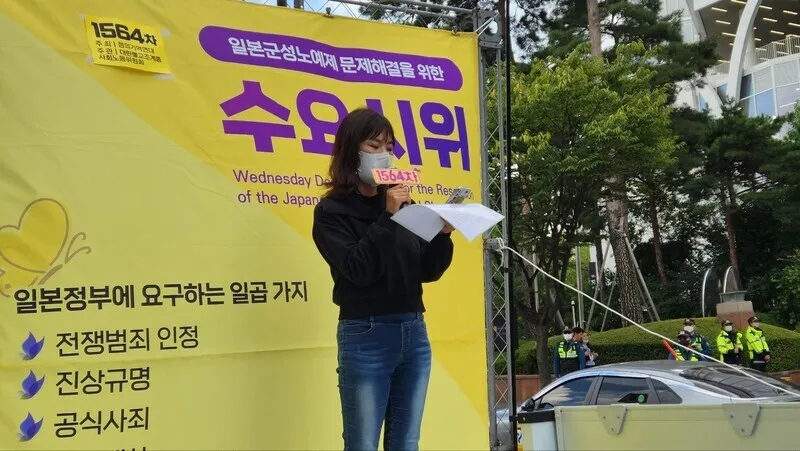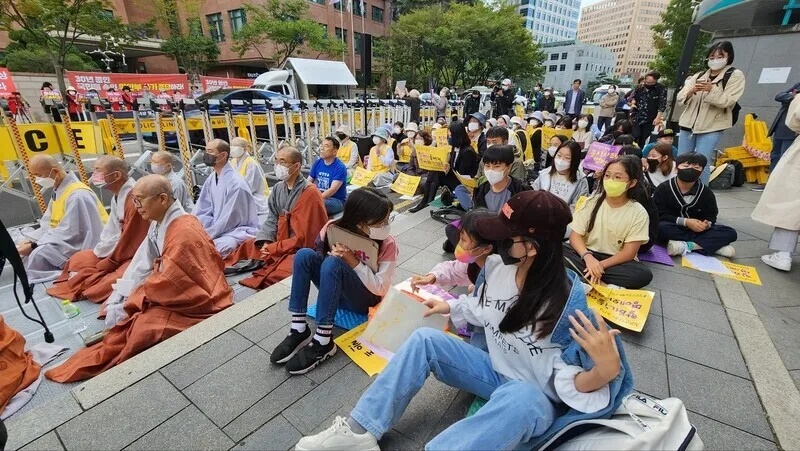hankyoreh
Links to other country sites 다른 나라 사이트 링크
“Comfort women” advocates condemn plan to shutter Gender Equality Ministry

“The victims of Japanese wartime sexual slavery are the ones at the forefront facing historically deep-rooted gender discrimination. Does the Yoon Suk-yeol administration, which says it will abolish the Ministry of Gender Equality and Family, intend to make all gender discrimination and gender-based violence the responsibility of individuals?”- Kim Mi-hye, activist at the Progressive University Students Network.
On Wednesday, the 1,564th weekly Wednesday Demonstration was held in front of the former Japanese Embassy in Jongno, Seoul, to resolve the issue of Japanese wartime sexual slavery.
Citizens taking part in the demonstration criticized the government’s Tuesday announcement about its decision to abolish the Ministry of Gender Equality and Family (MOGEF) and instead establish a lower-level agency handling related policies under the Ministry of Health and Welfare. Activists said the move “disregards structural gender discrimination.”

“The abolition of the Ministry of Gender Equality and Family was a topic discussed various times by past conservative governments, but they always reversed their opinion in the end after recognizing its importance,” activist Kim Mi-hye said.
“We clearly witnessed a misogynistic crime in our society recently through the Sindang Station stalking murder case,” Kim continued, adding, “We women are still living in a system of gender discrimination, including career disruption.”
Regarding the deep rootedness of the gender discrimination issue, Kim said, “Victims of Japanese wartime sexual slavery are the ones who have historically been facing this issue at the forefront. These victims prove that gender-based violence and gender discrimination in our society over the years have resulted from structural gender discrimination.”
Kim also strongly criticized the government’s decision regarding the MOGEF. “Nevertheless, the government, which hastily pushed ahead with the 2015 South Korea-Japan ‘comfort women’ agreement, is [now once again] trying to attribute deep-rooted gender-based violence and gender discrimination to the fault of individuals by abolishing the Ministry of Gender Equality and Family.”

Lee Jong-geol, co-representative of the South Korean Coalition for Anti-discrimination Legislation, also shared his thoughts about the situation.
“The Yoon Suk-yeol administration, which has been completely unable to enact any anti-discrimination legislation, is talking about abolishing the MOGEF at a time when we should be commemorating the woman working at Sindang Station who was murdered as a result of criminal stalking,” Lee said.
“The current job of the state is to create a society where women can work safely,” Lee added.
On Tuesday, the government put forth a reorganization plan that would abolish the MOGEF and transfer its related functions to the Ministry of Health and Welfare.
Civic groups responded with heavy criticism, calling the plan a "regression of gender equality policy."
“We strongly condemn the administration and the People Power Party, which bring up abolishing the Ministry of Gender Equality and Family every time they face political crisis, for trying to reverse women’s human rights policies and gender equality,” a statement, published by a joint action group made up of 286 women’s civic organizations across the country aimed at preventing the abolition of the MOGEF, said.
“Yoon Suk-yeol and the People Power Party should immediately stop attempting to abolish the Ministry of Gender Equality and Family after listening to the voices of women and countless citizens who oppose the abolition of the ministry,” the group demanded.
By Park Ji-young, staff reporter
Please direct questions or comments to [english@hani.co.kr]

Editorial・opinion
![[Correspondent’s column] Coupang’s game in Washington follows familiar pattern [Correspondent’s column] Coupang’s game in Washington follows familiar pattern](https://flexible.img.hani.co.kr/flexible/normal/500/300/imgdb/original/2025/1226/8217667391873536.jpg) [Correspondent’s column] Coupang’s game in Washington follows familiar pattern
[Correspondent’s column] Coupang’s game in Washington follows familiar pattern![[Editorial] Coupang’s attempt to hide behind US won’t win back Korean consumers [Editorial] Coupang’s attempt to hide behind US won’t win back Korean consumers](https://flexible.img.hani.co.kr/flexible/normal/500/300/imgdb/original/2025/1226/1817667387971465.jpg) [Editorial] Coupang’s attempt to hide behind US won’t win back Korean consumers
[Editorial] Coupang’s attempt to hide behind US won’t win back Korean consumers- Coupang under fire for possible obstruction of investigation into its customer data leak
- [Editorial] Coupang founder’s contempt for workers, customer security knows no bounds
- [Column] Confessions of a Coupang-holic
- [Editorial] Kim Bom-suk’s arrogance on full display in boycott of Coupang leak hearing
- [Editorial] The facts of Yoon’s insurrection are clear — justice cannot be further delayed
- [Column] Trump destroys government
- [Column] A post-Western world approaches
- [Column] Offshore balancing, or carving out spheres of influence?
Most viewed articles
- 1Korea to trial next-gen train capable of sub-2-hour Seoul-Busan trip starting 2030
- 2Kim Jong-un’s hidden motive in criticizing South Korea’s nuclear submarine push
- 3[Editorial] Coupang’s attempt to hide behind US won’t win back Korean consumers
- 4Coupang under fire for possible obstruction of investigation into its customer data leak
- 5[Correspondent’s column] Coupang’s game in Washington follows familiar pattern
- 6Real-life heroes of “A Taxi Driver” pass away without having reunited
- 7Moon Jae-in renews call for end-of-war declaration, peace treaty on Korean Peninsula
- 8Chang Chun-ha’s family hopes to know truth of his death after 37 years
- 9Chinese money flooding into South Korean companies
- 10Russian architect personally witnessed Empress Myeongseong’s assassination by Japanese ronin, accoun